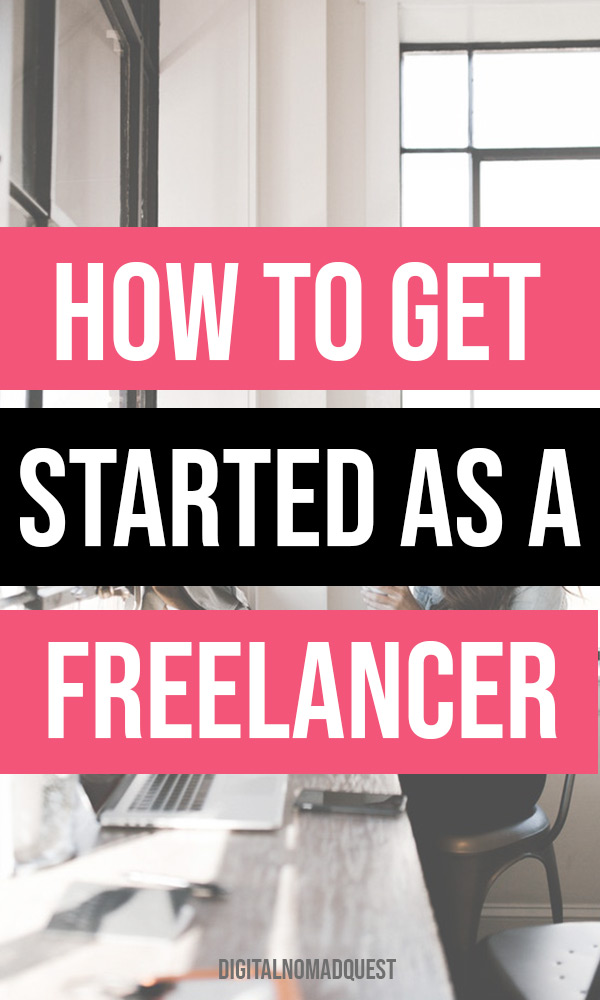In this post we’ll talk about how to get started a freelancer online and make money.
With so many industries digitalizing and the world now so well-connected by the internet, freelancing online is becoming increasingly popular. After all, why battle the daily commute and spend 8 hours confined to an office when you could be relaxing on your sofa or, better yet, reclining next to a pool somewhere hot and sunny?
Hiring professionals on a freelance basis can be attractive to employers, too. Reduced office space, lower employee-related costs, and access to a workforce which can be adjusted in line with the needs of the business are just some of the benefits on offer.
With this in mind, it’s no surprise that the freelance workforce in the European Union is reported to have doubled between the years 2000 and 2014. In fact, Morgan Stanley have gone so far as to predict that freelancers could come to represent up to 50% of the US working population within the next decade.
So the good news is, if you’re skilled (or interested in becoming skilled) in a job which can be done from a computer, freelancing online is an option for you. Depending on your background, you might consider freelancing in:
- Editing and Proofreading
- Copywriting
- Administration
- Graphic Design
- Research
- Language Teaching
- Voiceovers
- Customer Service
- Web Design
- Journalism
- Exam Marking
- Sales
- PHP Development
- HTML 5 Development
- Video Game Art
- Illustration
- Marketing
- Data Entry
- Javascript Development
The list goes on and the options are numerous. But how exactly do you become an online freelancer? And how can you make sure you’re getting the most out of it? Whether you’re looking to supplement your regular income by freelancing on the side or planning for freelance work to become your full-time job, these few simple steps can set you up for freelance success.
How to Get Started as a Freelancer Online and Make Money
Choose your business
The obvious first step is to decide what type of freelance business you want to establish. As you’re considering freelancing, it’s likely you already have an idea in mind. It goes without saying, but clients are paying for your work and your earnings depend on your ability to build a positive reputation, so this needs to be something you’re good at. If you’re skilled in multiple disciplines, specialize in what you’re most experienced in.

Invest in yourself
Your chosen business might involve a skill you’ve already developed extensively, perhaps through university study. It might be a field you’ve worked in before, or maybe it’s a new venture entirely. Whatever the case, gaining some credentials will boost your appeal to prospective clients, and it’s important to make sure your skills are up-to-date with industry standards. With thousands of courses available online, up-skilling has never been more convenient! As an online freelancer, you are your own biggest commodity, so don’t shy away from investing in yourself. You’ll see the return in the long run.
Build a portfolio
No matter what qualifications or experience you have, potential clients are going to want to see examples of your work before hiring you. Nobody is going to trust that you’re good at what you do without evidence, so having a variety of samples that showcase the scope of your ability is the best way to guarantee a contract. Your portfolio could consist of work from previous jobs, or if you’re just starting out, you’ll need to take the time to produce some examples from scratch.
Figure out how you want to operate
There are two main options for freelancing online: you can create your own website, or you can create a profile on an online platform designed to connect freelancers with employers. Each of these approaches has their pros and cons. Having your own website, for example:
- Allows you to create a personalized space on the web to showcase your work and testimonials
- Gives clients a selection of ways to contact you and negotiate contracts
- Makes you look professional and well-established (assuming your website is well-designed and kept up-to-date).
But running a website as a freelancer can have some downsides. These could include:
- Costs involved in renting/ purchasing a domain (though these can be low)
- The extra work involved in designing and maintaining a website (or the cost of hiring another freelancer to do this)
- The time and cost of marketing your website effectively in order to attract clients and secure work.
For these reasons, many freelancers turn to websites such as Upwork, Fiverr, and CloudPeeps. Platforms like these have the benefits of offering:
- A convenient way to find clients: there are thousands of potential contracts at your fingertips, you can filter them according to your preferences, and applying is easy
- A straightforward way to build your reputation: once you’ve completed your first project and gained some positive feedback, it’s easy for others to see that you’re trustworthy and talented
- Guaranteed payment: these websites make sure you’re paid for the work you do, and are on-hand to mediate if there are any disagreements between you and your client.
Of course, there are also drawbacks to this approach. If you use one of these online platforms you face:
- A lot of competition: there are thousands of clients posting projects for you to apply for, but there are also thousands of freelancers to compete against
- Losing a percentage of your earnings in fees, as these platforms take a cut of your money. This amount varies from site to site, and may reduce after you’ve earned a certain amount. It’s important to note that many freelancers feel it’s worth paying these fees to have the protection of guaranteed payment.
Of course, how you decide to work is down to personal preference. But if you’re just starting out, want to freelance conveniently around an existing job, or are hoping to get off the ground quickly, using an online platform may be your best option.
Market yourself effectively
If you are using a website like Upwork, you won’t need to do any ‘marketing’ as such, but you will need to maximize the effectiveness of your profile. Choose a professional-looking photograph, and keep your personal summary concise and relevant. Big-up your experience, qualifications and skills, but avoid overselling yourself. If you overstate your abilities and fail to live up to the impression you’ve given, this will be reflected in your feedback. Disappointed clients are bad for business!
On the other hand if you’re going solo and advertising your services through your own website, you’ll need to market your services a lot more. Social media can be a great tool here, so create a Facebook page, Instagram, Twitter account, and encourage your friends and family to share. LinkedIn can also be a good place to promote yourself, and some freelancers also advertise on websites like Craigslist, or search listings on job boards like indeed to find clients.

Get your pricing right
Wherever you’re finding your clients, one of the trickiest parts of freelancing online is figuring out how much to charge for your work. If you charge too little, you’ll struggle to make enough money to get by; charge too much and you’ll put off potential clients. Pricing is all about balance, and you’ll need to ask yourself the following questions:
How experienced am I? It’s a huge gamble for a client to invest in a freelancer they’re unfamiliar with, especially one with little or no feedback. If you’re new to the game you’ll need to keep your prices low to begin with, to increase people’s willingness to risk their money on your services.
How much is my time worth? If you’re just starting off and need to fill your schedule, offer lower rates in order to guarantee work. As your portfolio of clients begins to grow, you can charge more and be more selective of the rate you’re willing to accept.
How much are other freelancers charging? Research the online profiles of others offering the same services. Take into account their experience, qualifications, and feedback/ testimonials. Work out where you sit amongst them, and price yourself accordingly.
Learn from the experts
The move to freelancing can be a big change and wisdom is something that can only be gained through experience. Thankfully, learning from the experiences of other online freelancers can help you to avoid common mistakes and setbacks.
If you know somebody who’s already freelancing online, open a conversation about it and ask any questions you have. If you’re working in similar fields, they might even be able to connect you with some useful contacts.
Otherwise, there’s a wealth of articles, blogs and websites out there bursting with advice. You might want to check out these popular podcasts:
The Freelance Podcast
The Accidental Creative
Being Freelance
Or if you prefer to study up the good old-fashioned way, there are plenty of books available on the subject, including these:
Creative, Inc: The Ultimate Guide to Running a Successful Freelance Business
This Year Will Be Different: The insightful guide to becoming a freelancer
The Freelancer’s Bible: Everything You Need to Know to Have the Career of Your Dreams – On Your Terms
Focus on building relationships
Once you start to get your freelance business off the ground, you’ll find that building relationships with your clients is invaluable. A happy client is likely to return with more projects, as it benefits them to have freelancers they can rely on. Securing long-term work like this increases the stability of your income, and minimizes the time you’ll spend applying for new contracts.
As well as consistently completing projects to a high standard and, of course, meeting your deadlines, good communication is vital here. Always keep your clients in the loop with your progress and take the time to create personalized, friendly interactions, even when sending brief updates. The more you make your clients feel valued, the more they’ll value you as a freelancer!
Find your groove
Freelancing can be lonely business, especially if you’re transitioning from an office or other workplace, to working online. Not having a network of colleagues whom you see every day can leave you feeling isolated, and some freelancers struggle to motivate themselves when working from home. It’s important to create a way of working which stimulates your productivity and maintains your mental well-being.
So if you struggle to be productive in your pajamas, have children distracting you, or if you just need a better WiFi connection or a change of scenery to boost your creativity, find somewhere else to work. Co-working spaces are an increasingly popular concept and could be an convenient option if you ‘re living in a city. These shared work spaces can be a great place to socialize, network, and maximize your productivity; check out Coworker.com to find one near you.
If you don’t live near a co-working space, your local coffee shop or library are other good options. And if you’re feeling adventurous, you could even take the freedom of online freelancing to the extreme and become a Digital Nomad. Many freelancers opt to travel to world whilst earning online, enticed by the beauty and low cost of living in areas like South East Asia.
Stay structured
Wherever you’re working, freelancing online allows you to control your own schedule, and is a great alternative to the standard 9-5 lifestyle. However, there are benefits to having structure and routine, and maintaining these can help you to maximize your efficiency as a freelancer.
Strive to stay organized, especially if you’re working on multiple projects with different clients. Keep a list or spreadsheet of your on-going projects, record your progress, and check your deadlines daily. Starting each morning by creating a prioritized to-do list with achievable targets for the day is a great way to keep yourself motivated and on-track.
Finally, be sure to maintain an obvious separation between ‘work time’ and ‘free time’. This can be a challenge, especially if you’re working from home, but setting yourself designated work hours and breaks will help you achieve the work/ life balance you need to be a happy and efficient online freelancer.
So, what are you waiting for?
If you’re thinking of setting up as an online freelancer, why not get started? Banish the voice of self-doubt and join the millions of people ditching the daily grind for a freelance lifestyle today.
Hope you like these tips on how to get started as a freelancer online and make money. Let us know in the comments below if you have any thoughts as well!


